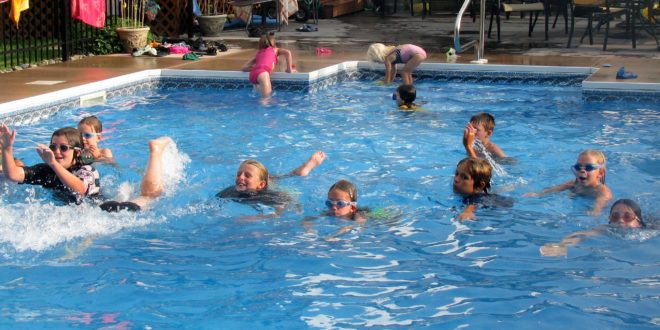HENDRICKS COUNTY – May 21st through May 27th is “National Healthy and Safe Swimming Week” presented by the National Center for Disease Control and Prevention (CDC). Summer temperatures have arrived and one of the best ways to stay cool and have fun at the same time is swimming. As pools begin opening for the season, Hendricks County Health Department (HCHD) officials urge citizens to take the following precautions so that swimming can stay safe and healthy for everyone.
“There are three common risks to consider when discussing safe and healthy swimming: recreational water illness (RWIs), injuries due to imbalanced pool chemicals, and injuries or drowning,” reports Julie Haan, Environmental Health Director for the HCHD.
According to the CDC, “Just one diarrheal incident in the water can release millions of diarrhea-causing germs like Crypto (short for Cryptosporidium), Giardia, Shigella, norovirus, and E. coli O157:H7.” Most cases of RWIs are due to Crypto because it is not easily killed by common pool chemicals such as chlorine and bromine. In fact, it can survive in properly balanced pool water for more than 7 days, which can cause swimmers to become ill if they swallow Crypto-contaminated water.
“The best ways to prevent RWIs are to avoid swallowing pool or hot-tub water, to shower yourself and your kids before swimming, to avoid swimming if you or your kids have had diarrhea in the past 2 weeks, to take your kids on restroom breaks every 60 minutes, and to check or change babies’ diapers in a restroom rather than poolside,” says Haan.
Imbalanced chemicals can also cause serious injuries to swimmers in pools, hot-tubs, and water-play areas. The CDC reports that between 3,000-5,000 emergency department visits occur each year due to recreational water chemical injuries such as burns, ingestion, and respiratory issues. Imbalances often occur due to over-chlorination, or mixing chemicals incorrectly such as chlorine and acids.
“Owners and operators of pools, hot-tubs, and water-play areas should always follow directions closely on product labels when handling and adding chemicals for maintenance,” adds Haan. “This would include wearing proper protective equipment, keeping chemicals out of reach from children and animals, never mixing chemicals undirected, never pre-dissolving chemicals undirected, and adding chemicals at poolside only when swimmers are out of the area.”
The goals of the HCHD are to promote public health, to prevent injuries and outbreaks, and to protect the public from harm. So, HCHD inspectors regularly inspect and test public and semi-public recreational water areas such as those at local water parks, apartment complexes, neighborhoods, and hotels throughout Hendricks County to ensure they are safe to use by the public. The HCHD also hosts an annual “pool school” for public and semi-public pool operators to educate pool operators on the state pool code and local policies, and for training on how to test and balance a pool’s water chemistry. Inspection reports are posted on the HCHD website, www.co.hendricks.in.us/health, the day after a pool or spa is inspected.
Lastly, drowning is the leading cause of unintentional injury and death in children ages 1-4 in the U.S., according to the CDC. In 2016, 3,786 people unintentionally drowned to death in the U.S., many of which were children. Whether by entrapment in a filter drain or simply due to lack of swimming ability, children are by far the most at risk of drowning.
“This is often seen as the type of tragedy that most parents never expected would happen to them, but it is vital for all parents to be vigilant in preventing their kids from getting hurt during swimming season,” urges Chase Cotten, Public Health Education Specialist for the HCHD. “Taking a few simple precautions to protect your kids is always worth it: do not leave your child alone near water, ensure pools have compliant drain covers, install barriers around and/or covers on pools, and take the time to teach your kids how to swim. It is also a great idea to learn how to perform CPR, just-in-case of an accident. It could happen to anybody.”
Each Hendricks County resident plays an important role in keeping each other safe and healthy during this swimming season. Please do your part in preventing RWIs, injuries due to chemicals, and drownings. For more information about pool health and safety, visit the CDC’s Healthy Swimming and Recreational Water webpage at https://www.cdc.gov/healthywater/observances/hss-week/index.html, the Indiana State Department of Health’s Recreational Water webpage at www.in.gov/isdh/25828.htm, or www.poolsafely.gov. The Hendricks County Health Department can provide information on pool safety to pool operators and the public. For more information on pool inspections and programming in Hendricks County, contact the Hendricks County Health Department Environmental Health Division at (317) 745-9217.
 WYRZ.org 98.9 WYRZ – The Voice of Hendricks County
WYRZ.org 98.9 WYRZ – The Voice of Hendricks County





